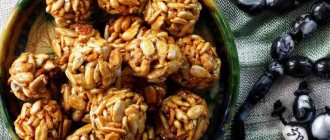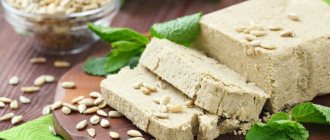In the first months of life, the baby's intestinal microflora has not yet been established. Any “wrong” product eaten by the mother can affect the baby’s well-being.
For this reason, nursing mothers often face restrictions on their menu. They are not always necessary and justified. One of these prohibitions is eating eggs.
Some doctors believe that eating eggs is possible and necessary, because the product contains many useful substances. Others argue that its introduction should be delayed until a later date - eggs can cause a severe allergic reaction. The nursing mother makes the final decision after weighing all the pros and cons.
Can a nursing mother eat eggs?
Egg whites are absorbed by the body faster than those found in meat. By consuming 2 chicken eggs per day, you can satisfy the need for this component by 50%. For a nursing mother, quail eggs are preferable - they are better digestible and have a lower risk of allergies.
In the first days after birth
The product must not be consumed in any form. In maternity hospitals, nursing mothers are recommended a special diet, which must be strictly adhered to.
In the first month
Continue your diet. The baby's digestive system reacts sharply to prohibited foods. Refusal to diet can lead to colic, bloating, and abnormal bowel movements in infants.
In the second month
By the end of the second month, eggs can be added to the diet menu. But not as an independent product, but as an auxiliary ingredient. For example, when preparing cheesecakes or pancakes. Use only the yolk.
Watch the baby's reaction. If the baby is capricious, has a rash or an upset stomach, introduce the product later.
In the third month
Boiled quail eggs are recommended. Start with the yolk. Monitor your reaction throughout the day. If not, continue introducing the product. For the 3rd month of breastfeeding, you can take no more than 1 piece per day and no more than 2 times a week.
Rules for use during breastfeeding
Breastfeeding women should practice good hygiene and caution when consuming eggs. The introduction of fried eggs should be limited to a nursing mother until the baby is three months old. This heat-treated product contains high amounts of cholesterol, causes heartburn, and is also difficult to digest. You can replace fried eggs with an omelette prepared without adding oil. A mandatory requirement is to treat the shell with a detergent, such as soap.
It is safe to eat eggs that have been boiled for at least 15 minutes after boiling. This protein product is compatible with vegetables, cereals, pasta that are familiar to the child and do not show allergies. There are certain rules of use recommended by pediatricians.
Scheme of egg administration (by month):
- It is recommended to avoid eating the white or yolk, but you can eat some cooked eggshells. Baked goods should be chosen without chicken protein.
- Gradually adding 1/3 of the yolk to the menu, as well as increasing the daily norm to a whole yolk.
- Eating a limited amount of eggs and observing the child's reaction.
If after this period (three months) no negative features of the product have emerged, you can safely eat eggs - 3 chicken or 4 quail eggs per week.
In what form can you eat eggs during breastfeeding?
During lactation, boiled eggs are allowed. The product can be added to omelettes, salads, cheesecakes and other healthy dishes. The following types of cooking are allowed: boiling, stewing, steaming.
Raw
The product should not be eaten during breastfeeding. Despite the fact that most poultry farmers vaccinate their poultry, it is not worth the risk. Eating raw eggs can cause salmonellosis. Crude protein is not digestible by the human body.
Boiled chicken
The product will benefit both mother and baby if consumed in moderation. Start with half an yolk a day - compared to white, it is better absorbed and has a lower risk of allergies.
Omelette
A tasty and nutritious dish can be safely included in the diet, starting from the 3rd month of lactation. For the product to be beneficial, follow the recommendations:
- all ingredients must be fresh;
- steam an omelette;
- oil can be used, but not more than 0.5 tsp;
- do not overuse salt and seasonings - they can cause an allergic reaction in the baby;
- cook no more than 2 times a week.
To prepare, use chicken or quail eggs. For variety, you can make an omelette with bread in a frying pan, an omelette with ricotta, or an omelette with green peas.
Fried eggs
The product will do more harm than good. It should be avoided during breastfeeding. When frying, most of the beneficial substances disappear. Due to bad cholesterol, the risk of blockage of blood vessels increases. In some cases, eating fried eggs causes indigestion. The danger of the product is also in the high content of carcinogens that occur when sunflower oil is heated.
Soft-boiled
The product is not recommended for use throughout lactation for the same reason as raw eggs. Pathogenic microbes die only when hard-boiled.
Quail
Compared to chicken eggs, quail eggs lead in the amount of vitamins A, B1, B2. They contain more phosphorus, potassium, iron, magnesium. Quail eggs rarely contain antibiotics, and the risk of salmonella infection is lower. Despite this, quail eggs can only be consumed boiled.
Goose, duck, ostrich
Goose eggs are more nutritious (185 kcal) than chicken eggs (157 kcal). They can only be consumed after heat treatment - there may be dangerous E. coli on the shell and inside the product.
Boil fresh eggs for 5 minutes. longer than those that were in the refrigerator.
Duck eggs are considered one of the most high-calorie eggs - 100 g of the product contains 190 kcal. At the same time, they have a specific smell and taste. The increased fat content gives the protein a viscous, oily consistency. The product is difficult to digest and it is not recommended to administer it during lactation. For the same reason, ostrich eggs are undesirable in the diet of a nursing mother - they are poorly absorbed by the body.
How to cook eggs while breastfeeding
The nutrition of a nursing mother should be dietary. Egg dishes are no exception. For this reason, scrambled eggs and other dishes where eggs are subjected to aggressive heat treatment - frying in oil - are not recommended. This cooking technology negatively affects both the nutritional value of the dish (making it too high in calories) and its benefits.
It is undesirable to eat eggs with undercooked yolks (poached, soft-boiled, “in a bag”). But an omelet or steamed scrambled eggs are the best options for preparing this product for a nursing mother. Such dishes belong to the dietary category, due to the absence of excess fat in the composition.
For comparison: the calorie content of fried fried eggs is 200–250 kcal, and a steamed omelet is only about 100 kcal.
Omelette recipe for nursing mothers
For preparation you will need:
- eggs - 2 pcs.;
- milk - 100 ml;
- salt and spices to taste.
Eggs and milk must be used chilled - then the omelet will turn out airy.
Steamed omelette is a great option for a light dinner for a nursing mother.
Method of preparation:
- Whisk all ingredients and pour into the container used for cooking.
- You can prepare a steam omelette in a slow cooker, steamer, microwave oven, or in a regular saucepan if there are no other kitchen gadgets in the house. Then the container with the egg mixture is placed in another pan of boiling water. It is important that the water level is lower than the sides of the omelet dish.
- The dish cooks quickly - about 5-10 minutes. You can check readiness by cutting the omelette in the middle. It should be homogeneous, without a liquid center.
The benefits and harms of eggs for nursing women
An egg is a storehouse of nutrients:
- Vitamin A is a natural antioxidant that strengthens the body's defenses;
- vitamin D - ensures the prevention of rickets in infants;
- iron is a microelement required to restore the mother’s body after large blood loss during childbirth;
- calcium - strengthens bones;
- potassium, phosphorus - ensure the correct process of hematopoiesis, help prevent diseases of the cardiovascular system;
- folic acid - helps restore the body after childbirth;
- lecithin - cleans blood vessels;
- choline - improves memory;
- lysozyme - destroys viruses and bacteria;
- fatty acids - have a beneficial effect on the health of hair, skin and nails.
With regular use, the product has a beneficial effect on the mother’s body - blood pressure is normalized, bones are strengthened, and muscle mass is strengthened. Protein is well absorbed by the body and promotes weight loss.
The disadvantages of eggs include the presence of cholesterol and the likelihood of salmonella infection.
Useful properties of eggs
Few people know about the beneficial properties of eggs.
Eggs are a popular product. But few people know about their benefits:
- They are a source of easily digestible protein;
- Contains vitamin D, necessary for strengthening bones;
- The yolk contains lecithin - normalizes the functioning of the liver and brain;
- They are 98 percent absorbed by the body;
- Helps strengthen vision and prevent cataracts, thanks to luten;
- Recommended for the prevention of cancer;
- Regulate blood formation;
- Eliminates negative environmental impacts;
- Contains folic acid;
- Rich in microelements and amino acids. The composition includes magnesium, phosphorus, iron, calcium, manganese;
- The shell is no less useful; it contains a large amount of calcium and about 30 other microelements.
The benefits of eggs during lactation
The question of whether you can eat eggs while breastfeeding is quite logical, since they are included in many products - baked goods, pasta, sauces.
The benefits for a nursing mother during breastfeeding are as follows:
- Source of protein;
- Low calorie content;
- Large percentage of water;
- Leadership in the presence of vitamins (B2, B4, B5, B9, A, B12, H);
- Rich composition of microelements (phosphorus, magnesium, iron, calcium).
Eggs are a source of protein
Chicken eggs for breastfeeding
Chicken eggs should not be completely excluded from the diet when breastfeeding, as they have a number of beneficial properties for mother and baby:
- Cleanse the body of toxins;
- Stimulate brain activity;
- Help overcome fatigue;
- Stimulates liver function;
- Promote postpartum recovery;
- By removing toxins, they improve skin condition;
- The composition of the yolk prevents aging;
- A chicken egg fills 15% of a mother's daily protein requirement.
Due to the presence of the above properties, the question of whether chicken eggs can be eaten while breastfeeding is given a positive answer.
Quail eggs for breastfeeding
Quail eggs
The use of quail eggs during breastfeeding, when compared with chicken eggs, has special important qualities:
- This is a more dietary product;
- Absorbed faster;
- Promote rapid recovery after childbirth, thanks to vitamins A and B;
- Strengthen immunity;
- Improves the functioning of the digestive system;
- Helps strengthen blood vessels;
- Activate brain activity.
On a note! In general, eating quail eggs is more beneficial than chicken eggs. If the baby does not react, it is recommended to use them during breastfeeding.
Reviews from mothers who breastfeed
Question to the expert
Angelina
I started eating boiled quail eggs at the 2nd month of lactation. I didn’t notice any changes in my daughter’s health. From 3 months I started eating more and one evening the child became capricious. I don’t know if this is related to the eggs, but I returned to the previous norm - 2 pieces a day, 2 times a week.
Ksenia
On the advice of my mother-in-law, I tried the yolk when my daughter was 4 months old. The result is terrible allergies, colic, diarrhea, sleepless night. Since then I have not listened to anyone’s advice except that given by the doctor.
Daria
I know that eggs are a strong allergen, especially the white. I started introducing the yolk only 5 months after giving birth. And even when I made egg dishes, I only added the yolk. There were no problems.
Hope
Girls, when it comes to the postpartum menu, everything is individual. I have three children. After the birth of my first child, I read a lot of literature and clearly planned the menu. She introduced eggs around the fifth month of feeding. I followed the same rule with the second one. And when my third son was born, at 3 months he accidentally ate the white along with the yolk. There was no reaction, and in the future I did not deny myself my favorite foods.
Angelica
I ate whatever I wanted without any problems, starting from the second month of my son’s life. The main rule is to observe moderation. I introduced eggs little by little, half a day. Once I ate 2 pieces a day at once, and off I went - crying, rash all over my body, diarrhea. The whole family was scared, it was difficult for everything to return to normal - we had to completely reconsider our diet.
Natalia
I haven't liked eggs since childhood. I included them in the menu very late, already at 8 months of age. The child had no allergies, but sometimes he had to eat through force.
Chicken eggs
Doctors recommend gradually introducing such foods into the diet. If the baby does not experience any negative reactions, then the woman can safely eat eggs every day. The high content of vitamins D and E in the product for a nursing mother contributes to:
- increasing skin elasticity;
- smoothing stretch marks;
- improving heart function.
According to nutritionists, the body absorbs eggs eaten by 98%. If a woman wants to lose weight after giving birth, she only needs to eat one egg with vegetables for dinner.
How to select and store eggs
Buy dietary eggs - they are considered the freshest. The deadline for their implementation is 7 days from the date of demolition and sorting. To buy a quality product:
- look at the expiration date;
- do not take eggs if the integrity of the shell is damaged;
- refuse to purchase if the product is not on a separate display, but next to meat or fish;
- the packaging must be clean.
The manufacturer does not always correctly indicate the expiration date. To determine freshness, place the egg in a glass of cold water. It is fresh if it lies flat on the surface. It rises up at one end - not the first freshness.
The optimal storage temperature is 0…+5ºС.
Before use, wash the product with warm water and soap. But you can’t do this immediately after purchase - the eggs will not store well.
Selection and storage
To feed a nursing mother, choose only absolutely fresh foods.
Since eggs are a highly perishable food product, you need to be especially careful when choosing them.
Eggs should only be purchased from large supermarkets, making sure they are within a week's shelf life. Under no circumstances should you buy these perishable foods on the street.
If necessary, you can determine the freshness of an egg by placing it in a glass of water. A good quality product should sink. If it floats, it is spoiled.
Store-bought testicles bred in poultry farms may contain antibiotics and hormonal drugs. They are used to maintain hens in good condition and to prevent diseases. The need to use antibiotics is due to poor conditions for keeping chickens in close quarters. Hormonal drugs are administered to speed up fruit ripening.
When antibiotics enter the body of a mother and infant through food, they kill beneficial microflora in the intestines, and hormonal drugs disrupt the secretion of natural hormones. In this case, the baby suffers more than the mother.
It is much healthier to eat “village” products. Poultry is not exposed to drugs, since backyard chickens have more comfortable growing conditions than those in a poultry farm.
Eggs must be thoroughly washed with a brush in running water and soap to avoid salmonella contamination.
Both chicken and quail eggs should be stored in the refrigerator for no more than three months.
Recipes for a nursing mother
Although you can eat eggs just like that, it will be much tastier if you cook something from them. In combination with vegetables, chicken and herbs, you get delicious dishes that most mothers can eat from the 3rd month of lactation.
Omelette
The dish pleasantly diversifies the menu of a nursing mother. You can cook it in a frying pan or in a slow cooker. Use the cream and water chilled - this will make the omelette more fluffy.
Ingredients:
- chicken egg - 2 pcs.;
- sweet yellow pepper - 50 g;
- onion - 30 g;
- cream - 30 ml;
- olive oil - 1 tsp;
- sea salt - 0.5 tsp;
- green onion feathers - 0.5 tsp.
How to cook:
- Grind peppers and onions in any convenient way. Grease the bottom of the pan with oil and simmer the vegetables for 3-5 minutes.
- In a separate container, mix eggs, cream and 80 ml of water. Beat the mixture with a whisk. Add salt and chopped green onions.
- Pour into the pan with vegetables. You can't mix it.
- Fry over medium heat for 5 minutes on each side.
Before serving, garnish the dish with dill or parsley.
Salad
The ingredients can be varied. Instead of chicken, you can take any dietary meat. You can add vegetables to the recipe - tomatoes, cucumbers or sweet peppers.
Ingredients:
- chicken fillet - 100 g;
- cheese - 100 g;
- boiled eggs - 2 pcs.;
- walnuts - 30 g;
- yogurt or sour cream - 50 ml.
How to cook
Boil the fillet, cut into small cubes. Grate the cheese on a coarse grater. Chop the eggs and nuts with a knife. Season the salad with yogurt or sour cream. Garnish with a sprig of rosemary, parsley or dill.
Lactation is not a reason to follow a strict diet and give up your favorite foods. Therefore, you should not do without eggs during lactation. If the baby does not suffer from allergic reactions, you should not deprive him of a source of vitamins and nutrients.
Possible harm
As with any ingredient during lactation, extreme caution should be taken when handling any eggs. The most negative consequences can be allergies. For example, chicken protein is many times more allergenic than yolk. In addition, allergy symptoms often appear as a result of a cumulative effect. That is, the initial signs are only rashes on the body, but in the future, in order to recover from the disease, it is necessary to completely abandon products containing eggs. A quail egg, unlike a chicken egg, will not cause such an allergic reaction, but only if the correct proportions of consumption are observed: in order not to harm the body, you should eat no more than 2 eggs per day. This is enough to replenish the daily requirement of nutrients. Mothers who have difficulties with the functioning of their kidneys and liver should not eat quail eggs.
Features of using the product for breastfeeding
As already mentioned, eating any eggs in the first month of a child’s life is strictly prohibited. Traces of heavy and allergenic food will definitely have a negative impact on the baby’s well-being and the functioning of his digestive system. Moreover, a nursing mother needs to monitor the composition of dishes and refuse those that contain eggs.
At the end of the newborn stage, a woman can begin to introduce quail eggs into her diet, but it is recommended to try chicken eggs only after 3-4 months.
- It is better to try a quail egg for the first time in the morning before feeding the baby. Eat a quarter of the yolk and stop your food experiments for three days. During this time, you should carefully monitor the condition of the baby and the nature of his stool.
- If your baby develops a rash, diarrhea, or begins to suffer from colic, stop introducing quail eggs into your diet. It will be possible to try them again only in a month.
- If the infant has no negative reactions to the new product, continue to introduce it in three-day increments, gradually increasing the volume.
- After introducing the whole yolk, you can begin to test the protein. You should also start with a quarter, and throughout the entire period of inclusion you need to continue to monitor the condition of the baby.
- You can eat no more than 2-3 quail eggs per day - despite their small size, they are comparable in value, nutritional value and richness to ordinary chicken eggs. You are allowed to eat no more than 8-9 pieces per week.
When your baby turns 4 months old, you can start introducing chicken eggs into your diet. The product should be included in the menu according to the same scheme - gradually increasing the volume of the yolk, and then the white. The daily norm for mother is 1 piece, and the weekly norm is 3 pieces. This is not just about scrambled eggs, omelettes and boiled eggs when breastfeeding - a woman must strictly monitor what dishes this product is added to and take this into account when calculating the norm.
Egg dishes for breastfeeding
If you think about it, most traditional dishes include eggs. They are added to hold the minced meat together when preparing cutlets, meatballs and meatballs, and for the viscosity of dough and mass for casseroles. When choosing recipes, you should be guided by whether their components are approved for nutrition during breastfeeding.
Spinach soup
This light vitamin soup will satiate your mother and provide her body with the necessary elements and fiber.
- 3 liters of water;
- 400 g frozen spinach;
- carrot;
- bulb;
- 5 potatoes;
- 3 quail eggs;
- butter.
Peel the onions and carrots, cut them and place in boiling water. Melt the butter in a frying pan and simmer the spinach until completely defrosted. When the carrots and onions are almost ready, add the peeled and diced potatoes to the pan. After 20 minutes, add spinach to the vegetable broth, boil and pour the eggs into it, stirring vigorously.
Chopped poultry cutlets
Finely chop the turkey or chicken pulp or blend in a blender bowl. Soak white bread in cold water, squeeze and puree along with onions. Combine the ingredients, add a little salt to the minced meat and add 1 chicken or 3 quail eggs.
Meatballs with buckwheat
In the classic version, rice is added to the minced meat; for a nursing mother, meatballs with buckwheat will be more useful.
- 0.5 kg of ground beef or chicken;
- 100 g buckwheat;
- bulb;
- carrot;
- 3 quail eggs.
Rinse the buckwheat and, after boiling for 10 minutes, drain in a colander. Finely chop the onion, grate the carrots and mix with the minced meat. Add buckwheat and eggs to the total mass, add salt and mix thoroughly. Form meatballs and steam them, in the oven or in a saucepan with the addition of water or broth.
Omelette
To prepare a classic omelet, beat 2 chicken eggs and 200 ml of milk into a homogeneous foam. To make the omelette denser, you can add 2-3 tbsp to the mixture. flour. You can make the dish more filling or original by pouring the egg-milk mixture over boiled pasta, pieces of steamed cutlets or steamed vegetables.
Cottage cheese casserole
Cottage cheese is a particularly valuable product for a nursing mother, as it helps replenish calcium reserves in the body, which are actively consumed during breastfeeding. A casserole made from it will be a pleasant and tasty treat for the whole family.
- 0.5 kg of cottage cheese;
- 3 tbsp. semolina;
- 1 chicken egg;
- 2-3 tbsp. Sahara;
- 2-3 tbsp. water or milk.
In a separate container, beat sugar with egg, and then combine with cottage cheese and water and beat with a blender. To make the baked goods more fluffy and stable, semolina is added to the “dough”. Grease the mold with a piece of butter, sprinkle with semolina and pour the curd mass into it. Bake for 40 minutes on low heat (180 degrees).
Gradually, you can try adding dried fruits or pieces of seasonal apples and pears to the cottage cheese casserole, and when the baby grows up, berries.
Eggs are both a healthy and dangerous product, so a nursing mother should be extremely careful and careful. To ensure that a new addition to a mother’s diet does not harm the baby, it must be included in the diet in a timely manner and with restraint.
Product value and effect on the body
An important argument in the benefits of eggs is that they are a complete, easily digestible protein, which contains the amino acids necessary for humans. They contain 15% of the daily dose of protein. This product is loved by athletes who consume mainly protein (the yolk contains harmful cholesterol).
Nursing mothers should try to ensure that their diet is dominated by more protein foods of animal origin (60-70%). This also includes eggs (5%).
Protein foods include the following products:
- dairy and fermented milk products (yogurt, kefir, low-fat cottage cheese, mild cheese);
- boiled meat and fish, eggs, potatoes, cabbage, peas, beans;
- wheat, rice, buckwheat and oatmeal, vegetables and fruits.
But, as you know, eggs are an allergen and if you do not control their consumption, side effects may develop. So can a nursing mother eat eggs?
The product contains useful substances:
- easily digestible protein;
- leucine;
- vitamins A, E, D, B12, B3;
- choline;
- biotin;
- selenium;
- various vitamins;
- iron, phosphorus, magnesium, calcium, potassium and others.
These beneficial substances bring invaluable benefits to the body, including the mother after childbirth and her child. How the product affects the body:
- The composition includes amino acids that have a positive effect on the brain. Memory improves, blood vessels become toned.
- The substance lysozyme fights pathogenic microorganisms.
- Eggs are a source of iron, preventing anemia in mother and child.
- If you eat one a day, the child will not experience a lack of vitamin D, which pediatricians prescribe for consumption in liquid form.
- The fatty acids included in the composition help cell growth (nails and hair grow faster).
A balanced and proper diet affects the amount and composition of milk produced during breastfeeding. With mother's milk, the child receives all vitamins and microelements. Eggs during breastfeeding will bring only benefits to the body of the mother and child:
- They will help cleanse the body of waste and toxins.
- Stabilize the functioning of the nervous system.
- They develop the child’s immune and hormonal system.
- Helps with weight loss (subject to proper nutrition and diet!).
- Will recover quickly after the birth of the child.
- Melatonin promotes rejuvenation of the body.
- Reduce the risk of developing cardiovascular diseases and cancer cells.
If you are allergic to your face, you can try a quail product. Their composition is identical, but the second type has more beneficial properties.
Quail eggs during breastfeeding help restore the body and normalize hormonal imbalance. Dietary product, does not cause allergies, is better absorbed. The raw product is healthier than the cooked product, but before eating it must be washed with soap.











